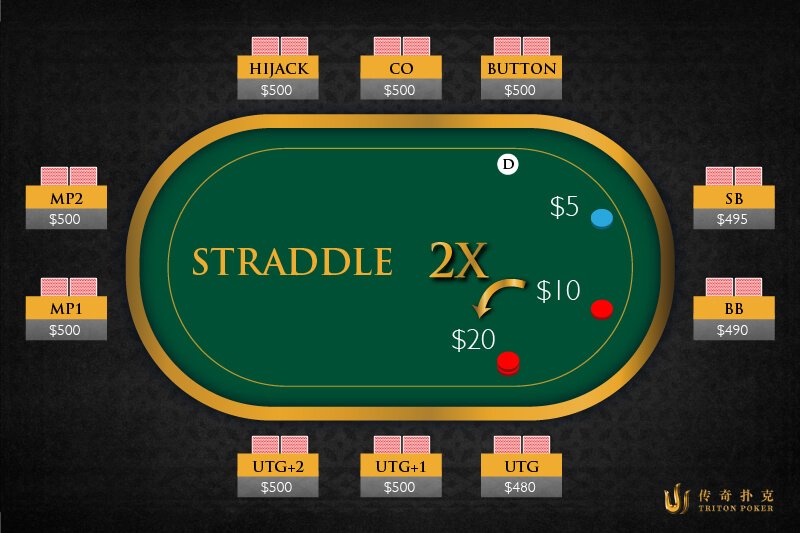Getting to grips with the terminology is all part of poker’s fascination. It also goes hand in hand with good tactical awareness and a sound success strategy.
While Straddling or “Playing a straddle” is often regarded as a negative in terms of profit over risk it should not be automatically dismissed. Let’s understand exactly what it is and two scenarios where it’s certainly worth a punt.
What is a straddle in Poker?
A player can initiate this play in any poker game and it is a reasonably regular occurrence for those involved in Texas hold’em.
When a player opts to straddle they are putting double the big blind (BB) amount before cards are dealt. It is usually the player to the left of the BB that makes this play. Once it is carried out, all others following players must either call or raise the bet placed.
A ‘live’ straddle acts like the BB
Good poker etiquette requires dealers to announce when a live straddle is ‘in play’. When “live” it acts like the BB. If none of the players raise, it is then down to the player straddling to decide whether to raise. This can only be done when it is their turn to play.
In the event, the dealer does not make the announcement this is termed as a dark raise. If this is the case the player straddling has no option in the event all other players simply call.
3 common types of straddle:
If you intend to make straddling a part of your success strategy it is vital that you check the house rules. This is because not all poker rooms allow it, some do but specify which position the play can be made from, and the majority of online rooms do not allow it. Un-capped straddles for $1/$2 and $2/$5 are quite rare.
3 common types of the play you will come across:
- Under The Gun (UTG) Straddle: This is the classic play. It is where the UTG player lays double the BB BEFORE cards are dealt. They then act as the last preflop.
- Mississippi Straddle: This is easier to play than spell! It allows any player from any position the opportunity to straddle first. When the option is taken up they can straddle any amount preflop. By making this play they then have the advantage of acting last before the flop (assuming another player does not re-straddle, but this is less common). It is more often than not that the button makes this play. As with the UTG play, this option must be taken up BEFORE cards are dealt.
- Un-capped Straddle: As the term suggests, this removes the “double the BB limit” on the size of stake placed.
Should you make this play in Texas hold‘em?
While not all poker tacticians will agree, the general advice has to be No. This is because the only real advantage of straddling is the fact that during the first round of betting you have the advantage of acting last.
However, you have made a blind and if another player raises you will need a lucky hand in order to call. Taking everything into account this strategy usually costs you money.
Two exceptions:
- Lower stake games not to your liking: If you are involved in a hold’em game with lower stakes than you like, straddling can solve your issue because you can make the play from the start. It is seen as a good tactic if you feel your strategy will take other players out of their comfort zone. i.e. the majority will fold. In this situation, the play can work in your favor.
- One to strongly consider: When you are in the button position in a game allowing a Mississippi Straddle you have a huge advantage. This high ground is gained because you have the last position of that particular round. Such a play often encourages the BB to fold if they have poor cards.
Don’t dismiss straddling!
As a poker player, you should use straddling with caution and common sense. Do not dismiss it from your armory, but do use it wisely.
Watch Paul Phua straddling like a boss!
During the last Triton Poker Super High Roller Series 2018 in Jeju, South Korea, Tom Dwan and Paul Phua went head to head for a huge cash game pot.
After a long period of hesitation, Tom shoved ALL-IN with AQ against Paul Phua, who straddled. Unfortunately for him, Paul was holding the Pocket Aces!

